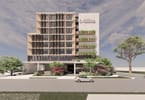EDINBURGH, Scotland — Scotland has long attracted crowds of tourists drawn by golf and whisky, but now the new government, which wants independence from London, says it is giving the sector a higher priority.
There is a strong emphasis on appealing to Scotland’s diaspora through projects like a family history complex in Edinburgh which aims to entice more foreigners to visit Scotland to research their Celtic roots.
The Scotland’s People Centre will allow visitors to access well over 60 million records of births, deaths, marriages, wills, land ownership and coats of arms dating back to 1553, under one grandly domed roof for the first time.
It should open in June and organisers hope it will appeal to overseas visitors from countries such as the United States, Canada and Australia, to which Scots have historically migrated.
Another example is Homecoming Scotland, a year-long programme of events in 2009 to mark the 250th anniversary of national poet Robert Burns’s birth targeted at the diaspora.
The projects were planned before the election last year of the pro-independence Scottish National Party (SNP), but highlight the kind of event it is backing as it bids to show Scotland can stand on its own two feet economically.
Tourism Minister Jim Mather told AFP that he saw the sector not only as a way of boosting the economy, but also of raising the world profile of this country of five million people — and even enticing some Scots in exile to move home.
The tourism sector “has to become bigger” as the nation considers a possible move towards independence, he added.
“Tourism has an importance beyond its direct economic impact,” he said.
It is “essentially our advertising voice to the world, our empathetic connection to the world, our ability to bring back the Scots diaspora — 29 million people out there — getting them to consider buying more Scottish produce, coming back for further visits, buying a home in Scotland, investing in Scotland, coming back to Scotland full-time.”
The government is consulting on plans to extend devolution to full independence. Polls suggest Scots are in favour of more powers for Scotland, with some going further and indicating majority support for independence.
“This is a fantastic time for Scotland because things are changing,” Mather added. “There is a mood of can-do coming through.”
But not all of the government’s efforts to promote tourism — a sector worth four billion pounds (5.3 billion euros, 7.8 billion dollars) and providing nine percent of all Scottish jobs in 2006 — have met with universal approval.
Plans by United States tycoon Donald Trump to build a huge golf complex near Aberdeen, northern Scotland, were vetoed by local councillors last year amid opposition from environmental campaigners and some residents.
Amid concern about the negative signal this could send to foreign investors, the decision was called in for review by Edinburgh, which is expected to rule on whether it can go ahead in the coming months.
The main opposition Labour party also criticised the government after it unveiled a new 125,000-pound slogan for the country, “Welcome to Scotland”, last year, accusing it of lacking imagination.
Professor John Lennon, director of the Moffat centre for travel and tourism business development at Glasgow Caledonian University and a government advisor on tourism, said the sector was now getting a higher priority.
Scotland aims to increase tourism revenues by 50 percent by 2015, he said, in a target set in 2006 under the previous administration.
And officials were beginning to “major up” their focus on heritage and family history, he added.
“The idea that you appeal to the ethnic communities outside Scotland…that’s a very strong latent market that Ireland has been very good at tapping into,” he told AFP.
“This crowd are saying it’s important, (we) need to understand how competitive it is.”
afp.google.com
WHAT TO TAKE AWAY FROM THIS ARTICLE:
- There is a strong emphasis on appealing to Scotland’s diaspora through projects like a family history complex in Edinburgh which aims to entice more foreigners to visit Scotland to research their Celtic roots.
- The projects were planned before the election last year of the pro-independence Scottish National Party (SNP), but highlight the kind of event it is backing as it bids to show Scotland can stand on its own two feet economically.
- Amid concern about the negative signal this could send to foreign investors, the decision was called in for review by Edinburgh, which is expected to rule on whether it can go ahead in the coming months.






















